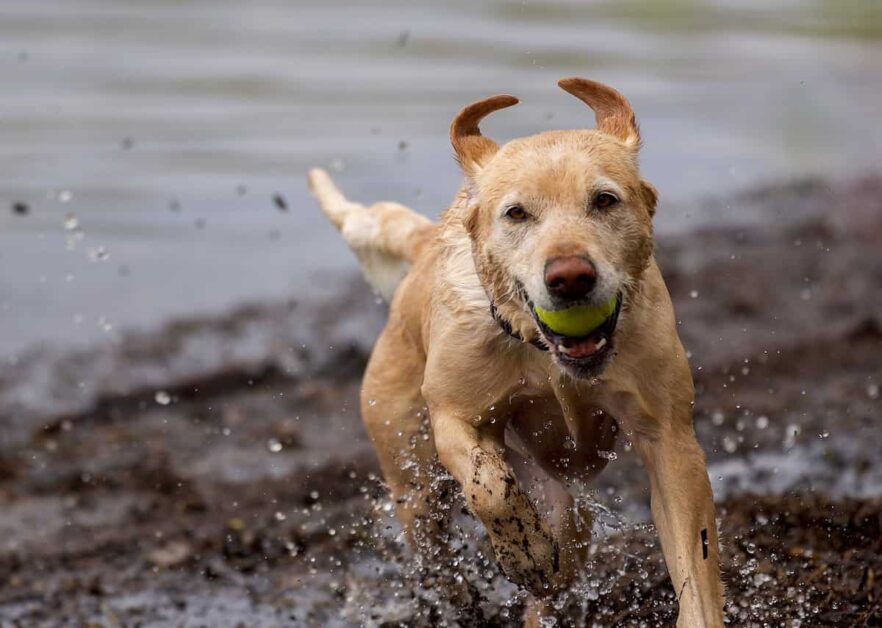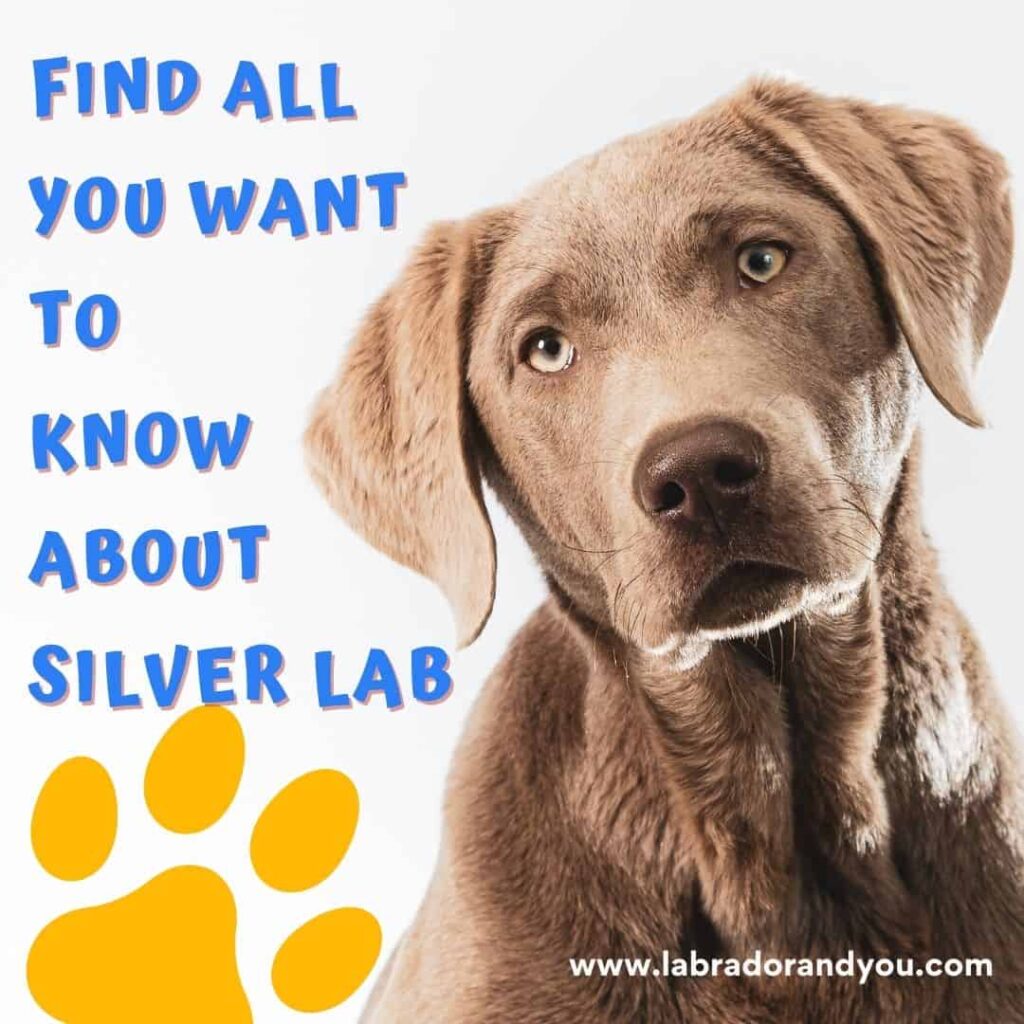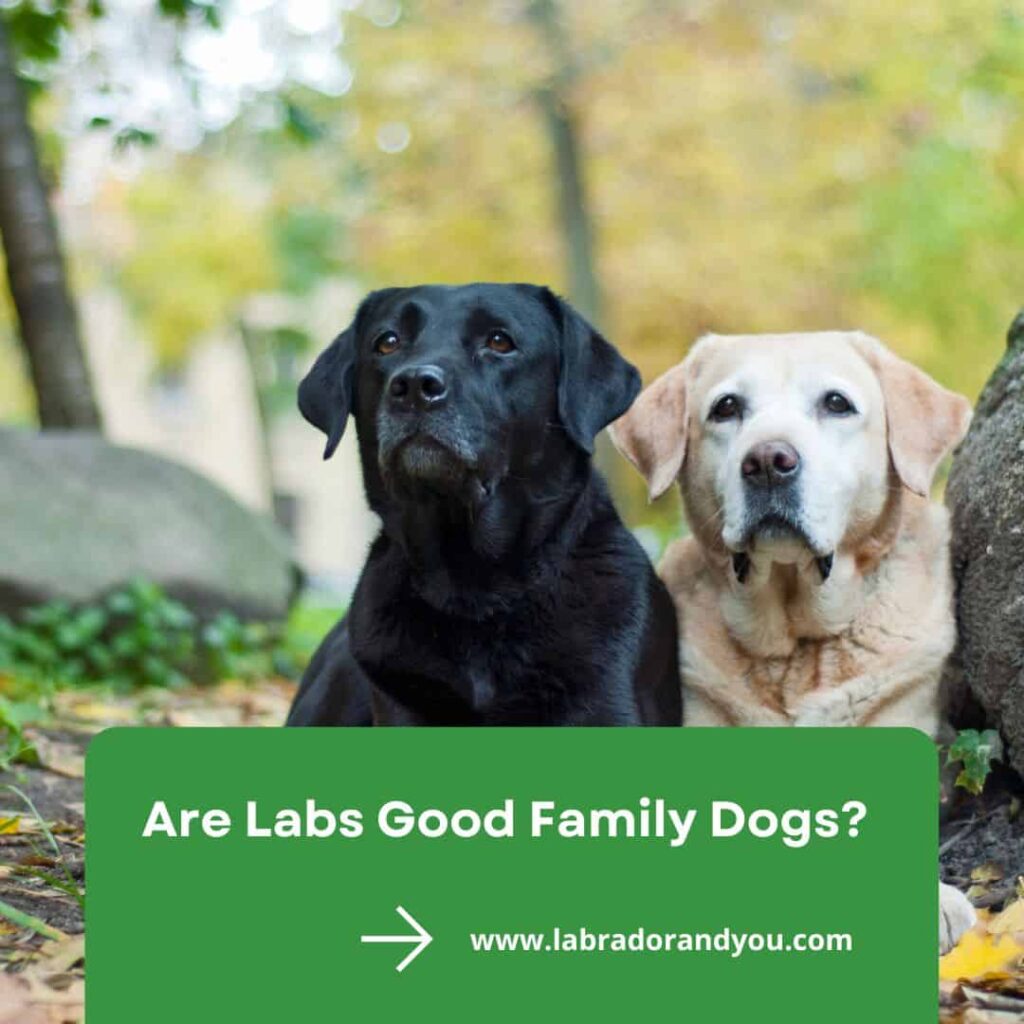Dog imprinting is how a young pup forms a strong bond with its primary caregiver, typically during the early weeks of life. This individual becomes their go-to source for comfort, safety, and food.
The imprinting process plays a crucial role in establishing social hierarchy and assisting puppies in learning behaviors from their caregiver – another dog or a human. Let’s check out some signs your dog imprinted on you. For example, if your puppy imprints on you, they will closely observe your actions and try to emulate them as part of their learning process.
Can Dogs Imprint On People?
Absolutely, dogs can imprint on people, forming strong bonds with their primary caregivers. This fascinating behavior is instinctive for them as it ensures they establish a nurturing connection with the human who provides comfort, safety, and nourishment.
Imprinting on humans isn’t restricted to just one breed; it can happen among all dogs. For instance, a German Shepherd might form an unbreakable bond with its owner through rigorous training sessions.
At the same time, a Golden Retriever may become attached due to their favorite person’s tender love and affection showered upon them. Dog owners must recognize such imprinting behaviors and nurture these deep attachments.
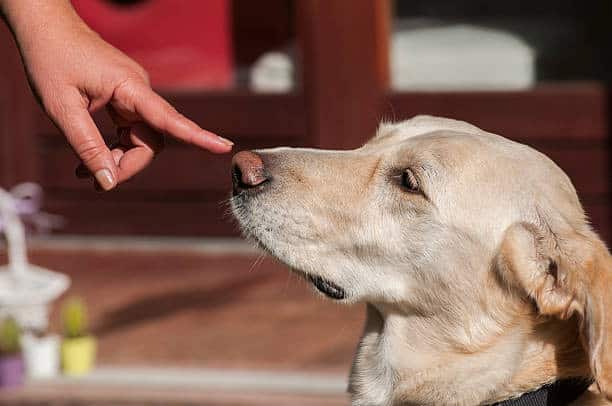
Dog Imprinting Stages
Imprinting in dogs involves creating deep attachments and strong bonds with their primary caregiver, a crucial aspect of their development as social animals.
The Canine Imprinting Stage (0 To 8 Weeks)
The canine imprinting stage occurs between 0 to 8 weeks of life, and they begin to develop deep attachments to their environment and caregivers. During these early weeks, the mother dog provides her pups warmth, nourishment, and security.
During this stage, young dogs interact positively with other animals and humans within their immediate environment. Exposure to various sights, sounds, smells, and textures helps puppies build confidence when faced with new situations later in life.
Handling them gently shapes a pup’s temperament as they explore the world outside their den or whelping box around three weeks of age.

The Human Imprinting Stage (8 To 12 Weeks)
During the human imprinting stage, which occurs between 8 to 12 weeks of age, puppies begin to form strong bonds with their primary caregiver or favorite person. This crucial developmental period is marked by increased social interactions and learning experiences that shape a dog’s behavior and personality.
For example, a young German Shepherd might recognize his owner preparing for a walk and excitedly anxiously wait by the door. Similarly, suppose the pet parent raises their voice in response to undesirable behavior like chewing on furniture.
In that case, the puppy quickly learns what actions are acceptable or unacceptable within the household rules. Belly rubs and snuggles strengthen bonds even more as dogs experience positive reinforcement through touch.

The Fear Imprinting Stage (8 To 10 Weeks)
During the fear imprinting stage, which lasts 8 to 10 weeks, puppies tend to be more cautious and fearful. This is when they learn what is safe and what isn’t in their environment.
However, suppose your puppy has had a traumatic event during this stage. They may become overly fearful or anxious later in life. Signs of fear imprinting can include excessive barking or whining when left alone or spending too much time hiding under furniture.
Signs Your Dog Has Imprinted On You
They’re Happy But Calm In Your Presence
If your dog is happy and relaxed around you, it’s a good sign that they have imprinted on you. When your furry friend is calm but still excited to be near you, they trust you implicitly and feel safe in your company.
Another way to tell if your canine companion has imprinted on you is by observing how they react when others enter the room. If they remain relaxed in your presence but become anxious or nervous around others, that’s a good enough sign.

Dogs Tend to be Excited To See You
Another sign your dog has imprinted on you is their excitement when they see you. If your furry friend greets you enthusiastically, they have formed a deep attachment to you. This behavior returns to the canine imprinting stage, where puppies learn to interact with other pack members, including their mothers.
They Check In On You
If your dog has imprinted on you, they will likely check in on you regularly. This can manifest in various ways, from following you around the house to coming over for quick snuggles or head boops throughout the day.
They may also gaze at you from across the room or pause what they’re doing to keep an eye on what you’re up to. This can also indicate separation anxiety in some dogs, so be careful with your training.
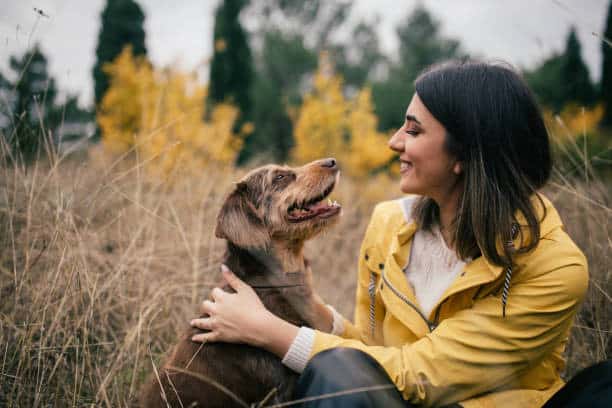
Your Dog Does Some Recon
Another sign that your dog has imprinted on you is if they do some recon while you’re out and about. Dogs are naturally curious creatures, and when they trust someone, they tend to be more comfortable exploring new environments alongside them.
For example, you take your dog to a new park one day. If they seem hesitant initially but start to wander around and sniff at things, it shows they have faith in your leadership.
They Make Eye Contact
Dogs use eye contact to communicate, and if they constantly seek your gaze, they trust you and feel safe around you. Eye contact can also be an indicator of your dog’s emotional state.
They may avoid making eye contact altogether if they feel anxious or fearful. On the other hand, if they approach you with relaxed eyes and a wagging tail, it’s a strong sign they feel deep attachment and love towards you.
They Get Incredibly Happy To See You
Your pet will greet you with excitement and enthusiasm Whenever you come home from work, vacation, or even a quick trip to the grocery store.
This behavior is cute and indicative of a deep attachment and affection towards you. Dogs are pack animals. So expressing joy at your arrival means they feel safe and comfortable around you. Not all dogs show this greeting behavior; some may be more reserved or independent than others.
They Mirror Your Behavior And Mood
One of the strongest signs your dog has imprinted on you is if they mirror your behavior and mood. Dogs are incredibly intuitive creatures, capable of picking up on signals from their human counterpart. If you’re feeling down or anxious, chances are your furry friend will sense it and act accordingly.
This mirroring behavior is indicative of a deep attachment to their primary caregiver. By following in your footsteps emotionally and physically, they feel a sense of comfort and security in knowing what to expect from you.
It’s also an excellent way for dogs to familiarize themselves with their environment by taking cues from their person on how to behave or react in certain situations.
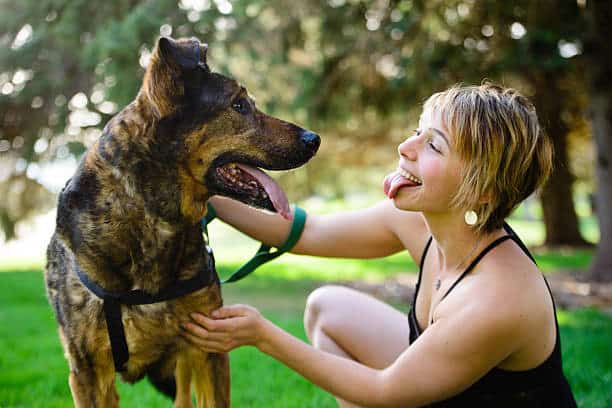
They Seek Physical Affection And Attention From You
If your dog has imprinted on you, one of the most noticeable signs is that they seek physical affection and attention from you.
Imprinting behavior in dogs creates deep attachments between them and their favorite humans. Petting, hugging, or cuddling with your pet strengthens this connection by releasing bonding hormones like oxytocin.
They Maintain Eye Contact
Dogs, like humans, use eye contact as a way to communicate and build connections. When your dog constantly stares into your eyes, it’s their way of showing trust, affection, and loyalty.
If your pup holds prolonged eye contact while growling or baring its teeth, it may indicate that they feel aggressive or threatened.
Similarly, if they avoid direct eye contact when interacting with you or other family members, this may indicate separation anxiety or fearfulness.
They Listen To Your Commands More Readily
When a dog imprints on you, they respond more to your requests and commands. This is because dogs bond with their primary caregiver during the imprinting stage, which helps them learn and understand human language.
They Like To Snuggle Your Stuff
If your dog likes to snuggle up with your clothing or other personal belongings, it could be a sign that they have imprinted on you. This behavior is an instinctual way for dogs to feel closer to their primary caregiver and surround themselves with scents that make them feel safe and secure.
Some everyday items that dogs may like to snuggle with include clothing, blankets, pillows, and even shoes. While this behavior might seem strange or annoying, it’s a strong sign that your dog has formed a deep attachment to you.
They Are More Relaxed Around You
Dogs feel secure around their primary caregiver, so if your dog can let its guard down while hanging out with you, it strongly indicates how deep the bond goes.
Relaxed body language, like lying down or spontaneously rolling onto their back to show vulnerability, is a good sign that indicates trust. Spending quality time can further strengthen the imprinting bond.
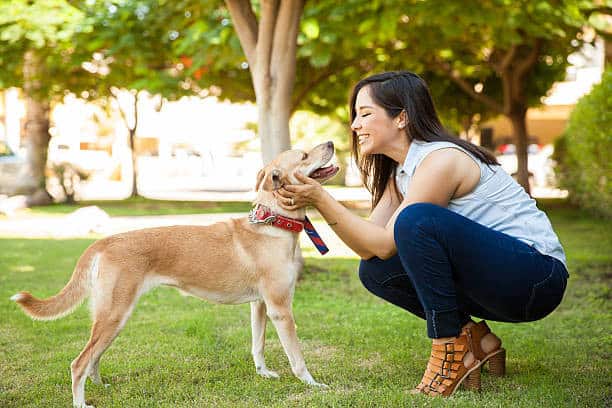
How To Strengthen Your Bond With Your Dog?
Train your dog regularly to reinforce positive behaviors and establish trust between you and your furry friend.
Train Your Dog
Teaching basic commands like sit, stay, come, and heel can help improve communication between you and your dog. Aside from teaching obedience commands, training can also involve fun and athletic activities like agility or scent work.
This strengthens the bond with your pet and provides physical health benefits for you and your pup. Reward good behavior with treats or belly rubs to reinforce positive habits.
Establish A Routine
Dogs thrive on predictability, so setting a routine for meals, walks, playtime, and other activities can make them feel safe and secure.
For example, if you take your dog for a walk in the morning after breakfast and then again before bedtime, they’ll expect that as part of their daily routine.
Engage In Athletic Activities
Dogs are naturally active and love physical exercise, so engaging them in fetch or taking them for long walks or runs can be very beneficial.
Not only do athletic activities keep your dog healthy and entertained, but they also provide an opportunity for training. Older dogs may prefer gentler exercise, while puppies require shorter sessions due to their still-developing bodies.
Incorporate Healthy Foods
Feeding your dog a balanced and healthy diet is one of the best ways to strengthen your bond with them. Incorporating nutrient-rich foods into their meals can improve their physical health and boost their happiness and well-being.
For instance, adding omega-3 fatty acids to fish or flaxseed oil can help support cognitive functioning. Vitamin E aids in maintaining healthy skin and coat.
As dogs age, so do their nutritional requirements. Therefore, caring for our puppies at a young age has long-term benefits. Introducing solid food slowly with fluids, then gradually transitioning to more solid food over weaning periods
Check each label closely, looking for DHA, which supports cognitive development. Avoid fillers like corn or wheat that could upset sensitive tummies.

Groom Your Dog And Give Them A Good Massage
Grooming your dog and giving them a good massage is an excellent way to strengthen your bond with them. Dogs love being pampered, and it’s a great way to show them how much you care.
Brush their fur regularly, trim their nails, clean their ears, and bathe them when necessary. While grooming, please also give them a gentle massage. Another benefit of grooming and massaging your dog is that it helps you identify potential health issues early on. Regular grooming sessions allow you to check for fleas, ticks, and lumps under the skin that may need veterinary attention.
It also teaches dogs to enjoy human touch while helping pet parents better understand their dogs’ body language so they can communicate more effectively.
Exercise Patience
Patience is vital when it comes to bonding with your dog. Imprinting takes time; some dogs may take longer than others to fully bond with their pet parent. While certain behaviors can be frustrating, such as chewing or barking excessively, remember that these are instincts for dogs.
Dogs have unique personalities that shape their behavior and imprinting process. Some shelter dogs may have had traumatic experiences in new environments, making forming trust more difficult.

Can Your Dog Understand You?
Dogs are perceptive creatures and can pick up on subtle environmental cues, including verbal commands and body language. While dogs cannot understand every word we say, they can learn to associate certain sounds and gestures with particular actions or behaviors.
In addition to understanding basic commands, many dogs develop an intuitive sense of their human emotions and moods. They may pick up on changes in tone of voice or facial expressions as indicators of how you’re feeling at any given moment.
This heightened awareness allows them to be empathetic companions who provide comfort and support during stress or anxiety.
Can Your Dog Be Too Attached To You?
While having your dog love and adore you is one of the best feelings in the world, having overly attached furry friends can have drawbacks. Dogs too attached to their owners can demonstrate problematic behaviors such as separation anxiety, excessive barking, and destructive tendencies when left alone.
- Establish boundaries with your dog early on so they don’t become overly dependent on you.
- Encourage independence by gradually increasing time apart through crate training
FAQs on signs your dog imprinted on you
How do you tell if your dog has imprinted on you?
When your dog follows you everywhere, seeks out your attention and affection, is protective of you, and trusts you implicitly, they have imprinted.
How do dogs pick their favorite person?
Dogs are attracted to people who are kind and gentle, give them food, and spend time with them.
How do you tell if your dog loves you?
Dogs show their love through physical touch (wagging their tail, licking your face, cuddling up to you), attention (looking at you with loving eyes, following you around, playing with you), and protectiveness.
How do you know if your dog doesn’t trust you anymore?
Your dog may no longer trust you if they avoid eye contact, have their ears back, tuck their tail between their legs, growl or bark, or snap or bite.
At what age do dogs imprint?
Dogs can imprint at a very young age, typically between 3 and 12 weeks old.
How do you tell if your dog is bonded to you?
Your dog is bonded to you if they follow you, cuddles up to you, looks at you with loving eyes, wags its tail when they see you, seeks your attention and affection, and protects you.
Do dogs bond more with one person?
Yes, dogs can bond more with one person than others. This is often the person who spends the most time with the dog, provides the most care and attention
Author Profile
- Site Owner And Dog Lover
-
Aritra, the founder of Labradorandyou.com, is a lifelong dog lover whose passion ignited for Labradors for their loyalty and intelligence. With extensive research and personal experiences, Aritra has become a Labrador expert, offering a rich resource on the breed. Labradorandyou.com provides reliable, timely, and evidence-based information, including Labrador-specific product reviews, training techniques, and care tips.
Labradorandyou.com was born out of Aritra's passion and his desire to share his profound knowledge about the breed. The site serves as a comprehensive resource, offering a wealth of up-to-date information for Labrador owners and enthusiasts alike
Also by the author
-
 Lab-TypesNovember 17, 2023Old Dog Seizures: Causes, Symptoms, and Treatment Options
Lab-TypesNovember 17, 2023Old Dog Seizures: Causes, Symptoms, and Treatment Options
-
 Lab-TypesNovember 17, 2023Why Is My Dogs Poop Yellow? 8 Reasons & Solutions
Lab-TypesNovember 17, 2023Why Is My Dogs Poop Yellow? 8 Reasons & Solutions
-
 ReviewsNovember 17, 2023The Only Hill’s Science Diet Review You Need To Read
ReviewsNovember 17, 2023The Only Hill’s Science Diet Review You Need To Read
-
 Lab-TypesNovember 17, 2023How To Adopt An Emotional Support Dog?
Lab-TypesNovember 17, 2023How To Adopt An Emotional Support Dog?
